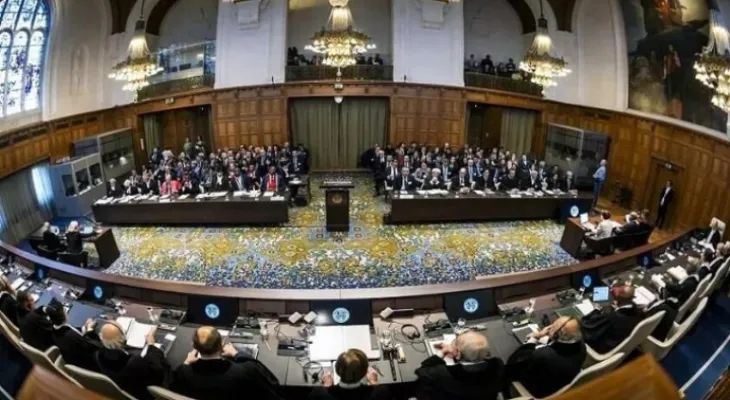Search here
Newspaper
Search here

Arab Canada News
News

Published: July 18, 2024
The International Court of Justice, the highest judicial body in the United Nations, will announce its advisory opinion tomorrow, Friday, regarding the legal consequences of the Israeli occupation of Palestinian territories since 1967.
President of the court, Judge Nawaf Salam, will read the advisory opinion in a public session that will be held at the court's headquarters, "Peace Palace," in The Hague, Netherlands, according to the Palestinian news agency and information agency "Wafa."
The delegation of the State of Palestine participating in the session is headed by the President Mahmoud Abbas's special envoy, his advisor for international relations, Riyad Al-Maliki, and includes: the permanent representative of the State of Palestine to the United Nations, Riyad Mansour, Assistant Minister of Foreign Affairs Ambassador Omar Awadallah, Assistant Minister of Foreign Affairs for Multilateral Relations Ambassador Ammar Hijazi, and the Ambassador of Palestine to the Netherlands, Rawan Suleiman. The delegation will hold a press conference immediately after the session in front of the court's headquarters.
The Fourth Committee of the United Nations General Assembly, which deals with political issues and decolonization, adopted on November 11, 2022, a draft resolution presented by the State of Palestine requesting a legal opinion and advisory opinion from the International Court of Justice regarding "the legal consequences arising from Israel's ongoing violation of the Palestinian people's right to self-determination, and its long-term occupation of the occupied Palestinian land since 1967 and its settlement and annexation of it, including measures aimed at changing the demographic composition of the Noble City of Jerusalem, its character and status, and how Israel's policies and practices affect the legal status of the occupation and the legal consequences of this status for all states and the United Nations."
Public briefings over a week
On February 26, the court began its deliberations on the case after listening to arguments and public briefings over a week presented by Palestine and 49 member states of the United Nations, along with 3 international organizations, namely: Egypt, South Africa, Algeria, Saudi Arabia, the Netherlands, Bangladesh, Belize, Bolivia, Brazil, Chile, Colombia, Cuba, the UAE, the United States, Russia, France, Gambia, Guyana, Hungary, China, Iran, Iraq, Ireland, Japan, Jordan, Kuwait, Lebanon, Libya, Luxembourg, Malaysia, Mauritius, Namibia, Norway, Oman, Pakistan, Indonesia, Qatar, Britain, Slovenia, Sudan, Switzerland, Syria, Tunisia, the Organization of Islamic Cooperation, the African Union, the Arab League, Turkey, Zambia, Spain, the Maldives, Fiji, and the Comoros.
The court's announcement of its advisory opinion comes at a time when international legal pressures on Israel, the occupying power, are increasing, as it continues its genocide against our people in the Gaza Strip, along with its ongoing crimes against our people in the West Bank, including occupied Jerusalem.
• A separate case from South Africa
This case is separate from another case brought by South Africa against Israel, the occupying power, for committing acts of genocide in its ongoing aggression against the Gaza Strip since last October. The court issued interim measures in the case, but the final decision on the case may take several years.
The rulings of the "International Justice" are final for the states involved in the case and are not subject to appeal, according to Article 94(1) of the United Nations Charter, which states that "each UN member undertakes to comply with the decision of the International Court of Justice in any case to which it is a party," and Article 94(2) states that in case of non-compliance, "the Security Council, if it deems necessary, may make recommendations or decide on the measures to be taken to enforce the judgment."
This is the second time the UN General Assembly has requested the International Court of Justice to issue an advisory opinion concerning the occupied Palestinian land.
In July 2004, the General Assembly requested a legal opinion regarding Israeli actions in the occupied territory in December 2003 concerning the construction of the separation barrier in the West Bank, including East Jerusalem. A few months later, in July 2004, the court found that the construction of the wall was contrary to international law and must cease, and that the constructed parts must be dismantled.
Comments